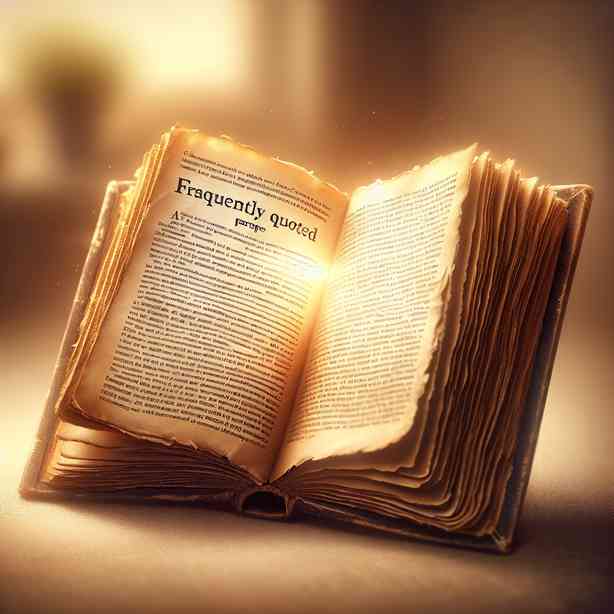
That One Paragraph You Keep Quoting이라는 주제를 가지고, 깊이 있는 정보를 잘 전달하는 내용을 작성해보겠습니다. 본문의 흐름이 자연스럽게 이어지도록 하고, 내용을 최대한 풍부하게 구성하겠습니다.
—
In the vast sea of literature, there often exists that one paragraph, that one quote, which resonates deeply within us. This particular excerpt may reflect our thoughts, ideals, or experiences so closely that it feels as if the author penned it specifically for us. The power of such a paragraph lies not only in its eloquent expression but also in its ability to capture the essence of human experience—whether it be love, loss, hope, or resilience. The significance of these words can inspire, motivate, and lead us to introspection, prompting us to explore deeper meanings within ourselves and the world around us.
One key aspect of why this paragraph resonates so profoundly is its universality. Literature has a unique way of bridging gaps between different cultures and eras, creating shared experiences among readers. For instance, when someone reads a well-crafted passage about love, they may find their own feelings mirrored in those words, regardless of the time or place in which they live. This ability to connect across boundaries reminds us of our common humanity and the emotional spectrum we navigate throughout our lives.
Additionally, the context from which this paragraph emerges plays a crucial role in shaping its impact. Whether it stems from a classic novel, an enlightening essay, or even a heartfelt letter, the circumstances surrounding its creation, including the author’s background and the socio-political environment, can imbue it with layers of meaning. Readers often find themselves considering what was happening in the world at the time of its writing, thus enhancing their appreciation and understanding of the content. The historical backdrop can serve as a rich tapestry against which the words are set, guiding us to reflect on how those themes continue to be relevant today.
The significance of “that one paragraph” is also tied to personal experiences. People might recall a moment in their own life when they first encountered those words—a quiet evening read, a poignant discussion with a friend, or a time in their life when they sought solace in literature. These moments become etched in memory, making the paragraph not just a collection of words but a reference point for personal growth and reflection. Each time one recalls that paragraph, they may find new meanings that align with their evolving understanding of life and self.
Moreover, the emotional resonance of such paragraphs cannot be overstated. The right combination of language, rhythm, and imagery can provoke a visceral reaction. We often experience a profound emotional response when we read something that articulates our innermost feelings, fears, or dreams. This emotional connection can lead to catharsis or empowerment, providing comfort in moments of uncertainty and fostering a sense of belonging to something greater than ourselves.
Literature, in its myriad forms, has the power to challenge our beliefs and encourage us to confront uncomfortable truths. A powerful paragraph can act as a catalyst for change, allowing us to question the status quo and reevaluate our perspectives. In doing so, it can ignite passionate discussions and inspire movements for social justice or personal transformation. When readers engage deeply with these texts, they are often propelled to take action, whether that means advocating for change or simply delving into the arms of further exploration of self and society.
In an age of information overload, this one paragraph can serve as an anchor amid the chaos. It provides clarity and direction, allowing us to decipher the noise surrounding us. Committing a powerful paragraph to memory becomes a source of strength, as reciting it can remind us of our values, aspirations, and the ideals we hold dear. It grounds our thoughts and can serve as a guiding principle when we face dilemmas, reconnecting us with our purpose.
In today’s digital landscape, the sharing of such powerful paragraphs has extended beyond traditional print literature. Social media platforms and online blogs allow individuals to disseminate impactful quotes and passages to a wider audience. This democratization of literature enables voices that may have previously gone unheard to gain visibility. As people stumble upon these resonant words, they often find themselves inspired to share their own reflections or create new narratives surrounding those themes, ultimately contributing to an ongoing dialogue about important topics within society.
As we reflect on the significance of that one paragraph consistently quoted throughout literary discussions, it reminds us of the transformative power of language. Words can bind us together or set us apart; they can heal or harm. Literature, rich with the collective experiences of humanity, reflects both our triumphs and trials, serving as a mirror for self-exploration. Engaging with literature allows us to navigate our destination while reflecting on the past, illuminating the path toward understanding ourselves and others.
In conclusion, “that one paragraph you keep quoting” serves as a profound testament to the impact of literature on our individual lives and the world. Its ability to connect, inspire, and prompt change underscores the necessity of engaging with written word and the beauty of shared human experience. As we continue to explore the realms of literature, let us remain open to encountering those impactful paragraphs, allowing them to enrich our lives and our understanding of the world in ways that are both deep and meaningful.


